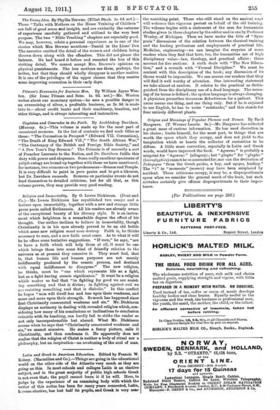Religion and Immortality. By G. Lowes Dickinson. (Dent and Co.)—Mr.
Lowes Dickinson has republished two essays and a lecture upon immortality, together with a new and strange little prose poem called Euthanasia. All his readers are already aware of the exceptional beauty of his literary style. It is an instru- ment which heightens in a remarkable degree the effect of his thought. Our author inclines to believe in immortality, though Christianity is in his eyes already proved to be an old bottle which some new religion must soon destroy. Faith is, he thinks necessary to man, and a new faith must come. As to what it will be he offers some tentative suggestions. "If men," he says, "are to have a faith which will help them at all, it must be one which brings them into some kind of friendly relation to the universe as at present they conceive it. They must feel, that is, that human life and human purposes are not merely indifferently produced by the cosmic process, and destined with equal indifference to disappear." The new religion, he thinks, must be " one which represents life as a fight, but as a fight having cosmic significance." It must be a religion which makes us feel that "in fighting for good we are assist- ing something real that is divine ; in fighting against evil we are resisting something real that is diabolic." In this conflict he hopes "men will dwell less and less upon their weakness, and wore and more upon their strength. So much has happened since first Christianity consecrated weakness and sin." Mr. Dickinson displays an acrimony in dealing with revealed religion which, con- sidering how many of his conclusions or inclinations to conclusion coincide with its teaching, can hardly fail to strike the reader as not only incomprehensible but absurd. What Mr. Dickinson means when he says that " Christianity consecrated weakness and sin," we cannot conceive. He makes a fancy picture, calls it Christianity, and then condemns it. He apparently does not realise that the religion of Christ is neither a body of ritual nor a philosophy, but an inspiration—an awakening of the soul of man


































 Previous page
Previous page